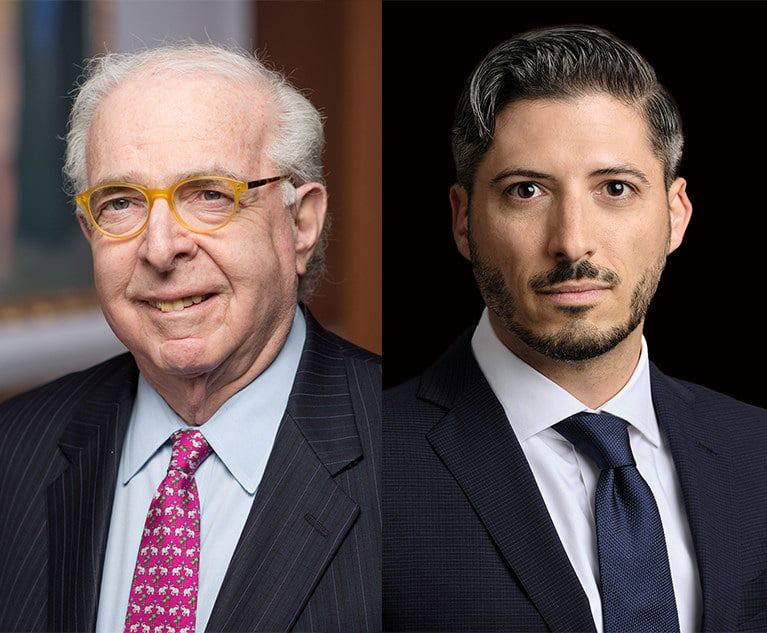The Benefits of Cost Shifting and the English Rule in International Arbitration
This article examines how the English Rule ensures that parties obtain complete relief, and how that rule assists in regulating party and counsel conduct.
August 05, 2022 at 02:10 PM
7 minute read
 International arbitration offers a variety of dispute resolution benefits in cross-border transactions, but one that is frequently overlooked by U.S. parties is the practice of cost shifting, which is commonly referred to as the English Rule on costs. This article examines how the English Rule ensures that parties obtain complete relief, and how that rule assists in regulating party and counsel conduct.
International arbitration offers a variety of dispute resolution benefits in cross-border transactions, but one that is frequently overlooked by U.S. parties is the practice of cost shifting, which is commonly referred to as the English Rule on costs. This article examines how the English Rule ensures that parties obtain complete relief, and how that rule assists in regulating party and counsel conduct.
Background
Unlike U.S. court litigation, in which parties generally bear their own costs (which is commonly called the American Rule), in international arbitration, arbitrators are typically required to assess costs for and against the parties after the merits of the dispute have been resolved (which is commonly called the English Rule). Those costs, which are usually awarded to the party that prevails on the merits, can include counsel fees (when the arbitration clause, arbitral rules, or controlling law/law of the seat allow it), and can constitute a substantial portion of the total amount awarded. Indeed, multimillion dollar cost awards are not uncommon in large matters, and cost awards can even exceed monetary damage awards in some instances. Consequently, costs are something to which international arbitration practitioners pay close attention throughout the life of an international arbitration.
While most American lawyers think of the English Rule as the "loser pays" rule because of the likelihood that costs will be assessed against the non-prevailing party, that view is an oversimplification, as it presumes that the prevailing party will obtain all of its costs without any consideration for what occurred along the way. In reality, the English Rule is more appropriately expressed as costs following the event, because arbitrators conduct a more meticulous and nuanced review of the manner in which the parties and their counsel conducted themselves throughout the matter in relation to individual issues and claims before making a final cost determination.
This content has been archived. It is available through our partners, LexisNexis® and Bloomberg Law.
To view this content, please continue to their sites.
Not a Lexis Subscriber?
Subscribe Now
Not a Bloomberg Law Subscriber?
Subscribe Now
NOT FOR REPRINT
© 2025 ALM Global, LLC, All Rights Reserved. Request academic re-use from www.copyright.com. All other uses, submit a request to [email protected]. For more information visit Asset & Logo Licensing.
You Might Like
View All
Art of the Settlement: Trump Attorney Reveals Strategy in ABC Lawsuit

Evolving Legal Standards to Combat Disqualification of Arbitrators for Failing to Disclose Conflicts of Interest
8 minute read
Court of Appeals Holds that Arbitration Agreements Can Be Formed Through ‘Clickwrap’ Process
8 minute read
Law Firms Mentioned
Trending Stories
- 1SDNY Criminal Division Deputy Chief Returns to Debevoise
- 2Brownstein Adds Former Interior Secretary, Offering 'Strategic Counsel' During New Trump Term
- 3Tragedy on I-95: Florida Lawsuit Against Horizon Freight System Could Set New Precedent in Crash Cases
- 4Weil, Loading Up on More Regulatory Talent, Adds SEC Asset Management Co-Chief
- 5Big Banks Did Great Last Year. What Does That Mean for Big Law?
Who Got The Work
J. Brugh Lower of Gibbons has entered an appearance for industrial equipment supplier Devco Corporation in a pending trademark infringement lawsuit. The suit, accusing the defendant of selling knock-off Graco products, was filed Dec. 18 in New Jersey District Court by Rivkin Radler on behalf of Graco Inc. and Graco Minnesota. The case, assigned to U.S. District Judge Zahid N. Quraishi, is 3:24-cv-11294, Graco Inc. et al v. Devco Corporation.
Who Got The Work
Rebecca Maller-Stein and Kent A. Yalowitz of Arnold & Porter Kaye Scholer have entered their appearances for Hanaco Venture Capital and its executives, Lior Prosor and David Frankel, in a pending securities lawsuit. The action, filed on Dec. 24 in New York Southern District Court by Zell, Aron & Co. on behalf of Goldeneye Advisors, accuses the defendants of negligently and fraudulently managing the plaintiff's $1 million investment. The case, assigned to U.S. District Judge Vernon S. Broderick, is 1:24-cv-09918, Goldeneye Advisors, LLC v. Hanaco Venture Capital, Ltd. et al.
Who Got The Work
Attorneys from A&O Shearman has stepped in as defense counsel for Toronto-Dominion Bank and other defendants in a pending securities class action. The suit, filed Dec. 11 in New York Southern District Court by Bleichmar Fonti & Auld, accuses the defendants of concealing the bank's 'pervasive' deficiencies in regards to its compliance with the Bank Secrecy Act and the quality of its anti-money laundering controls. The case, assigned to U.S. District Judge Arun Subramanian, is 1:24-cv-09445, Gonzalez v. The Toronto-Dominion Bank et al.
Who Got The Work
Crown Castle International, a Pennsylvania company providing shared communications infrastructure, has turned to Luke D. Wolf of Gordon Rees Scully Mansukhani to fend off a pending breach-of-contract lawsuit. The court action, filed Nov. 25 in Michigan Eastern District Court by Hooper Hathaway PC on behalf of The Town Residences LLC, accuses Crown Castle of failing to transfer approximately $30,000 in utility payments from T-Mobile in breach of a roof-top lease and assignment agreement. The case, assigned to U.S. District Judge Susan K. Declercq, is 2:24-cv-13131, The Town Residences LLC v. T-Mobile US, Inc. et al.
Who Got The Work
Wilfred P. Coronato and Daniel M. Schwartz of McCarter & English have stepped in as defense counsel to Electrolux Home Products Inc. in a pending product liability lawsuit. The court action, filed Nov. 26 in New York Eastern District Court by Poulos Lopiccolo PC and Nagel Rice LLP on behalf of David Stern, alleges that the defendant's refrigerators’ drawers and shelving repeatedly break and fall apart within months after purchase. The case, assigned to U.S. District Judge Joan M. Azrack, is 2:24-cv-08204, Stern v. Electrolux Home Products, Inc.
Featured Firms
Law Offices of Gary Martin Hays & Associates, P.C.
(470) 294-1674
Law Offices of Mark E. Salomone
(857) 444-6468
Smith & Hassler
(713) 739-1250






